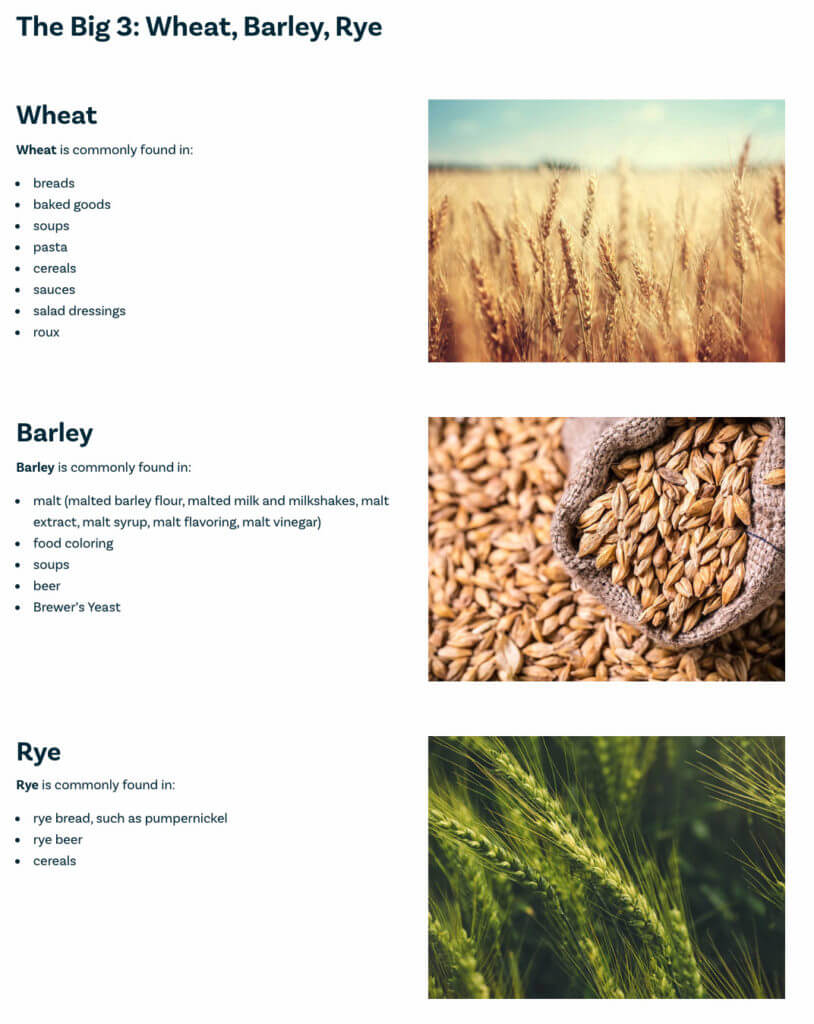Home » Blog » Understanding Gluten-Related Conditions
Posted on September 13, 2019
Understanding Gluten-Related Conditions
Gluten has become a frequent topic of conversation lately. But exactly what is it? And are there differences among suffering from celiac disease, being sensitive to gluten, and having an allergy to it? Kevin’s will translate the science into terms the average diner can understand.
Gluten
The term gluten encompasses several specific proteins that are found in wheat; gluten acts as a binding agent in numerous foods, beverages, and other products such as certain toothpaste and lip balm. The most common gluten grains include wheat, barley, and rye.

Source: Celiac Disease Foundation
Celiac Disease
Celiac disease, also referred to as CD, is an auto-immune disease where gluten adversely affects the small intestine, prevents it from properly absorbing nutrients, and causes damage. The disease is hereditary, but just because you may have the disease in your family does not necessarily mean you personally will be afflicted by it. Gluten.org explains, “To develop celiac disease a person must inherit the genetic predisposition, be consuming gluten, and have the disease activated…While approximately 33% of the general population has the genetic predisposition for CD, only about 1% will develop the condition.” Therefore, despite what many think, those who are actively affected by the disease are few.
Unfortunately, there are hundreds of possible symptoms of celiac disease, so it can be tough to diagnose by symptoms alone. Fortunately, however, there are blood tests and biopsies that determine if a person has the disease.
While the disease itself is well understood, there is no cure. Therefore, the treatment is to live a life that is free of gluten, which, based upon the extensive presence and use of it, can be difficult. With that said, difficult isn’t impossible, and fine dining restaurants like Kevin’s will often provide gluten-free menu options. The National Institute of Health (NIH) also provides helpful guidance and recommendations to make meal planning easier.
Wheat Allergy
While symptoms may be similar to those of celiac disease, having a wheat allergy is completely separate and distinct from having celiac disease; it is possible, though, to have both. Like many allergies, children can “outgrow” the allergy, but adults usually do not. With a wheat allergy, the body produces antibodies to try to eradicate the wheat from the system.
A key difference between a wheat allergy and celiac disease, gluten.org notes, is, “A person with a wheat allergy must avoid eating any form of wheat, but does not have trouble tolerating gluten from non-wheat sources.”
Luckily, there is also a test that can determine if someone has a wheat allergy or not; that test is conducted by an allergist. RAST testing is a blood test, as opposed to a skin prick test, the latter of which is used for common allergy testing such as for seasonal allergies.
Gluten Sensitivity
Gluten sensitivity (GS) is a third condition related to grains. Also known as non-celiac gluten sensitivity (NCGS) or non-celiac wheat sensitivity (NCWS), GS is not well-understood, and there are no tests to decisively diagnose the condition. Rather, it is considered a “diagnosis of elimination,” where the person has tested negative for conditions including, but not necessarily limited to, celiac disease and a wheat allergy. In addition, that person may be put onto a gluten-free diet, and if symptoms improve, the sensitivity determination may be made then.
Misdiagnosis
Because all of these conditions can be so similar, many people will self-diagnose, and do so incorrectly. Therefore, it is imperative, if you have any suspicion of a problem, speak with your health care provider to help ensure you are diagnosed properly and treated accordingly.
Because our food at Kevin’s is freshly prepared and made-to-order, ask in advance if you have any food concerns or requirements. We aim to please your taste buds as well as your dietary needs!
- Chef's View (2)
- Cocktails (10)
- Fine Dining (66)
- Food Safety (2)
- Uncategorized (1)